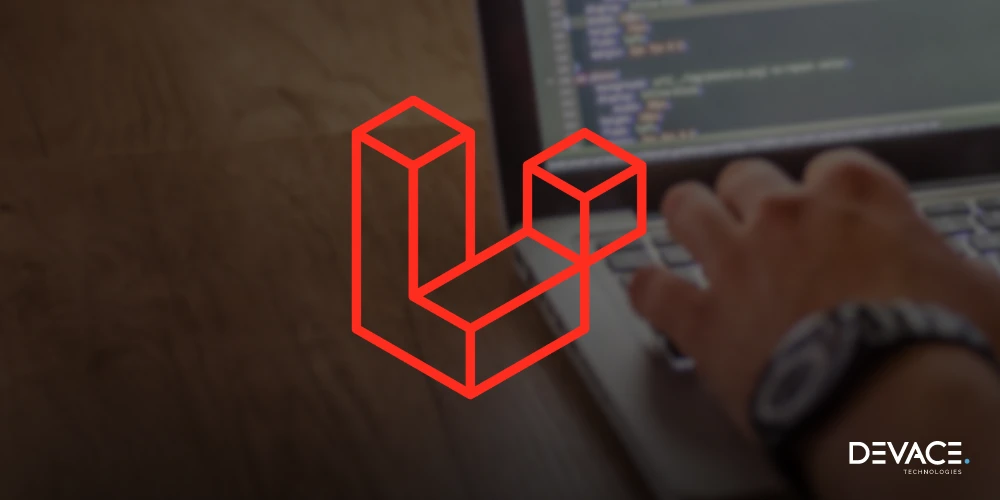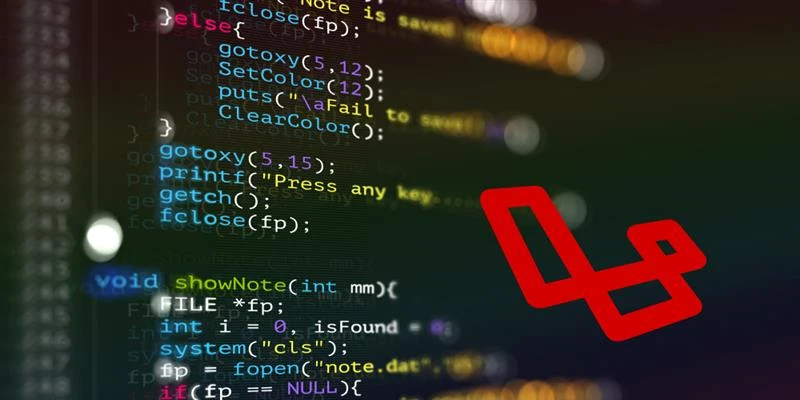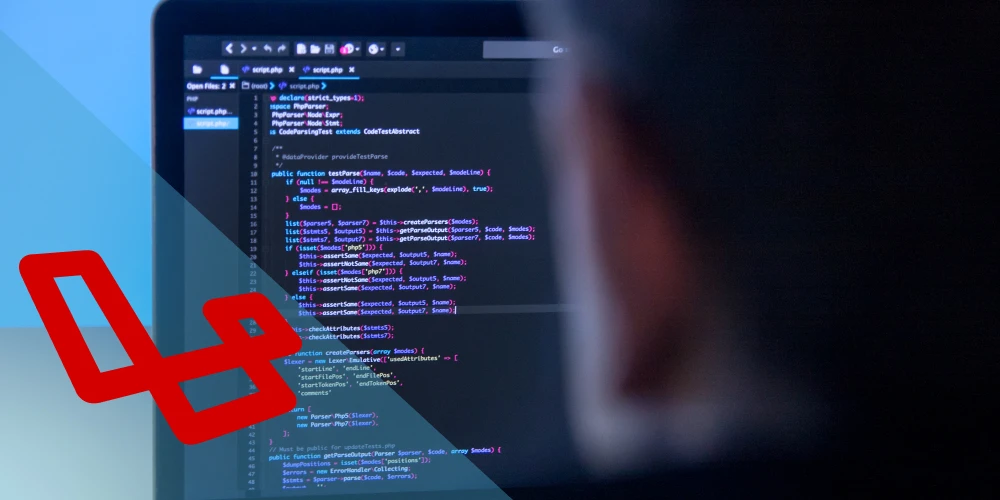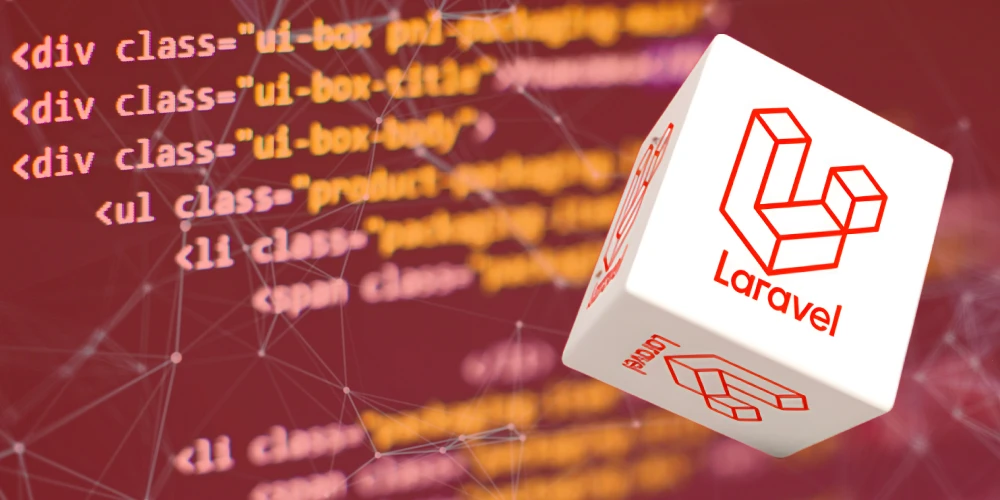Laravel developers are in demand more than ever as big organizations and enterprises seek Laravel web development. Laravel is one of the most popular PHP frameworks that offers powerful features such as security, caching, strong architecture, etc., making it an ideal choice for creating scalable web apps.
In this blog, we focus on how Laravel developers can help you build scalable web applications so that nothing disrupts, and you continue to deliver a seamless experience. So, let’s get into it.
How Does Laravel Help in Developing Scalable Web Apps?
Laravel, being a powerful PHP framework, offers features, functionalities, libraries, and packages that make it second to none. If you are looking to develop a scalable web application that can handle a large number of users with excellent performance, then Laravel web development is the right path to choose.
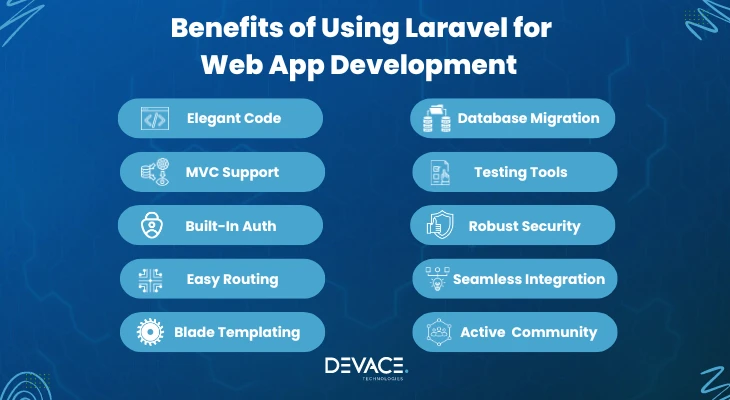
Laravel Features That Help Build High Performance Web Apps
We say that Laravel is best for scaling Laravel applications. But the question is how?
It offers a strong suite of features that are required to create applications which run faster, operate seamlessly, and deliver unparallel user experience.

Below are the top features of Laravel that help developers create scalable apps for you:
-
Job Queues
Laravel offers a feature called Job Queues that provides a robust and efficient way to handle background tasks. These background tasks include sending emails, generating reports, processing video uploads, etc., that are delegated to job questions instead of being executed at a user’s request. The most important benefit of this feature is that it improves the responsiveness of the application without any disruptions.
It allows the application to run seamlessly while operating heavy or time-consumptions tasks asynchronously.
Laravel supports Redis, Beanstalkd, and other queue drivers to handle these jobs. It also comes with enhancement tools aka Laravel packages for monitoring and management of the jobs assigned. These packages ensure smooth task execution as well as maintaining optimal performance during high-traffic periods.
Whether it’s Laravel vs Symfony, or Laravel vs another popular framework, the former always wins for its best job handling and management.
-
Database Optimization
Laravel offers Eloquent ORM that facilitates database management in the most efficient way, making it enjoyable to interact with the data. It helps in simplifying complex database queries into intuitive methods so that you can easily manage data relationships i.e., one-to-many or many-to-many – and retrieve data with optimized performance.
In addition to that, it also supports database indexing and query optimization that improves load times for larger datasets. In database optimization, you will also find features like query caching (which allows frequently accessed data to be stored in cache for faster access), pagination, and chunking of the database (which helps avoid memory exhaustion by breaking larger queries into smaller portions). All these features when combined make Laravel an excellent choice for web development services.
-
Horizontal Scaling
As we speak of scalability which entails optimizing the performance as the load increases – the Laravel framework of PHP also allows horizontal scaling by adding more servers to the infrastructure that helps in handling higher loads and increased user demand. You can distribute the traffic across the services in multiple instances using services like AWS, Azure, or DigitalOcean. It ensures fault tolerance and better performance.
This framework of PHP is developed in such a way that it works excellently in distributed environments so that you can scale your web app as needed. You do not have to worry about scaling your app as you want.
Laravel developers, when working on scaling Laravel application projects use Redis or Memcached for optimizing session management and caching that makes the app state remain consistent across multiple servers.
-
Load Balancing
Another key feature of Laravel for developing scalable web applications is Load Balancing. It distributes incoming traffic across multiple servers that ensure no request failure by routing the traffic to a healthy server. Servers like NGINX, HAProxy, or AWS Elastic Load Balancing (ELB) improve fault tolerance and work smoothly with Laravel to balance server loads across multiple instances.
So, if your web application’s traffic spikes suddenly, the load balancers will help deliver a smooth user experience with consistent performance and zero downtime. Another sparking factor of load balancing is that it enhances security by hiding the internal infrastructure from external clients.
-
Asynchronous Processing
Another key feature of Laravel that offers scalability for web development projects is Asynchronous processing. It allows the tasks to be executed in the background which is independent of the primary application flow. The main benefit of asynchronous processing to build Laravel web apps is that it is perfect for non-blocking operations like API calls, notifications, or file uploads.
Its built-in features of job queues and broadcasting capabilities facilitate the processing and execution of asynchronous tasks to ensure that there are no delays while the tasks are being processed.
By using its package i.e., Laravel Echo, it provides real-time updates to notify the users as soon as it is completed. Therefore, it is a popular choice for building scalable web applications.
-
Task Scheduling
By using the task scheduling system of Laravel, you can reduce redundancy and automate tasks such as sending out daily emails, clearing logs, or running database backups. It is done using Laravel expressive syntax/package Laravel’s Scheduler which eliminates the need to manually configure Cron jobs on your server.
In order to build scalable web apps using Laravel, you can schedule tasks directly in your app’s code, and then these tasks will be triggered based on the set intervals. It also supports task chaining and conditional execution, allowing for complex workflows to be scheduled with minimal effort.
-
Caching System
For Laravel web application development, the cache system of your web app must be strong. You can achieve this by leveraging Laravel for web app development. It has a robust caching system that stores frequently accessed data in the memory and reduces the need for database queries or API requests for repetitive data retrieval.
To make the cache system strong, Laravel supports multiple cache backends like Redis, Memcached, and file-based cache systems. You can use API to interact with caching backends. By using the Laravel caching system, you can cache individual views, query results, or even entire routes that enable faster loading times for users.
Top Laravel Packages You Can’t-Miss
Even though Laravel is a strong PHP framework in its own way, what further makes it strong is Laravel Packages that help extend the core functionality making development faster easier, and more efficient.
These packages are extremely helpful for web app developers to add specific features or integrations to their applications without having to start from scratch. These packages come in handy. It assists in real-time implementation and event broadcasting, manages queues, adds robust search capabilities, and handles tasks like authentication and billing.
In this blog, we discuss the three main Laravel packages as written below:
- Laravel Horizon
- Laravel Echo
- Laravel Scout

-
Laravel Horizon
This package is the best one for monitoring and managing the Redis queues in real time. Laravel Horizon provides an interactive and clean dashboard that enables you to keep up with tracking job metrics including processing times, failed jobs, and queue statistics. If you are looking for a Laravel package that assists you in seamless queue management by allowing you to configure worker settings and analyze job runtimes then Laravel Horizon can be the best package to use.
-
Laravel Echo
Another Laravel package is Laravel Echo that simplifies real-time event broadcasting and WebSocket communication. By using Laravel Echo, you can broadcast events in real-time to front-end clients, creating dynamic and interactive web apps. Eacho provide robust features like real-time notifications, chat systems, and live updates. In addition to that, it integrates seamlessly with Pusher and Socket.io to build easy communication between your app’s servers and client-side components.
-
Laravel Scout
With this package of Laravel, developers can add full-text search to your Eloquent models effortlessly. Laravel Scout can be easily integrated with popular search engines like Algolia that offer fast and accurate search functionality, Moreover, you can index your data, perform complex searches, and get instant results.
Top Companies That Use Laravel
Popular companies use Laravel for its robust features, flexibility, and most importantly scalability that helps them in delivering a seamless user experience. The top companies that use Laravel include 9GAG, BBC, InvoiceNinja, Alison, and Laracasts.
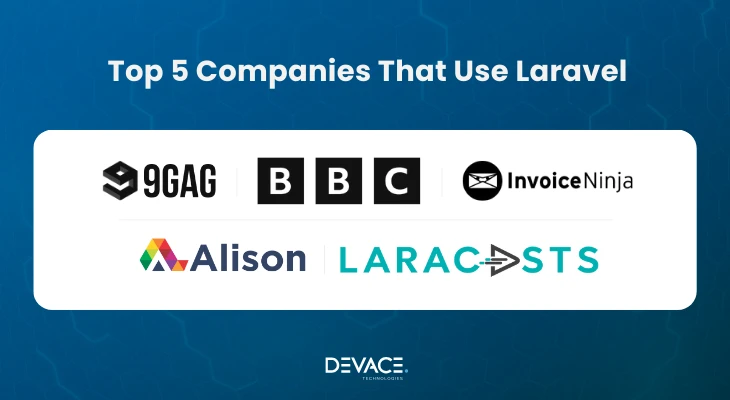
Why Should You Choose Laravel for Your Project?
When you start to explore frameworks and languages for your web development project, there will be a ton to find. However, some frameworks and languages stand apart from one another based on their distinguishing features. Here are the top five reasons why you should choose Laravel for your web development project.
-
Elegant Syntax
The most outstanding feature of the PHP framework i.e. Laravel is it has a clean and expressive syntax that makes it easy for developers to write well-structured and maintainable code. As the framework focuses on simplicity and clarity, it has also become a go-to choice for beginners. PHP programmers prefer to work with Laravel for the reason that it has a clean code that is simple and easy to understand.
-
Strong Security and Built-in Authentication
For any web development project, security is the key feature. With Laravel, you can get out-of-the-box authentication and authorization mechanisms, including password encryption, token-based authentication, and user role management.
-
Eloquent ORM
It offers Eloquent ORM that simplifies database management, allowing developers to interact with the database using expressive and human-readable syntax. Its Eloquent ORM supports relationships and query-building, making data retrieval and management easier.
-
Blade Templating Engine
If you want to create dynamic, interactive, and reusable layouts with minimal code then Laravel’s blade templating engine is the right choice. It supports inheritance, loops, and conditionals, making it easier to manage views without sacrificing performance.
-
Seamless Integration
Easy integration with third-party apps allows you to make your web app more seamless and feature-rich. Another top factor of Laravel in building scalable apps is that it easily integrates with third-party tools and services, such as payment gateways (Stripe, PayPal), cloud storage (AWS, Google Cloud), and APIs, making it a versatile choice for building modern web applications.
Hire Laravel Developers for Your Project
Hire Laravel experts and web developers to create scalable web applications that deliver seamless experience without any delays, errors, or disruptions. Our developers provide robust assistance in developing your projects from scratch till deployment or if you have to revamp your web app.
From our various engagement models, we ensure that our clients get flexibility and scalability in their team depending upon the project requirements.
Hire Laravel developers from Devace Technologies with a 14-day risk-free trial and start your project today.
Frequently Asked Questions
What are the best ways to scale web applications?
To scale web apps, optimize database queries, implement caching for faster data retrieval, use job queues for background tasks, and leverage load balancing to handle traffic. Horizontal scaling by adding more servers and optimizing code structure also helps handle higher user loads efficiently, ensuring smooth performance even with growing traffic.
How can you optimize a Laravel application?
You can optimize a Laravel app by caching routes, views, and queries, minimizing database queries using eager loading, and utilizing job queues for time-consuming tasks. Implementing tools like Redis for caching, optimizing assets with minification, and using Laravel’s built-in optimization commands ensures faster and smoother performance.
Can Laravel be used to build large-scale web and mobile apps?
Yes, Laravel can be used to develop large-scale web and mobile apps. Its modular structure, robust ecosystem, and scalability features like caching, job queues, and database management make it suitable for handling complex, high-traffic applications. Additionally, Laravel’s support for RESTful APIs enables seamless mobile app integration.
What are the challenges of scaling a Laravel application?
Scaling a Laravel application can present challenges such as database bottlenecks, handling large volumes of traffic, managing background tasks, and ensuring efficient caching. Properly distributing workloads through load balancers, managing queues, and optimizing database queries are necessary to overcome these challenges and maintain performance.
Why is scaling important for Laravel applications?
Scaling is crucial for Laravel apps to handle growing user traffic and demand efficiently. Without proper scaling, your app can experience slowdowns, crashes, or downtime during traffic spikes. Scaling ensures your app remains fast, reliable, and responsive as it grows, improving user experience and business continuity.
